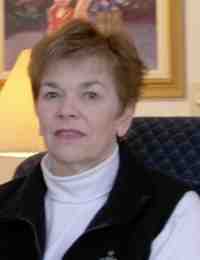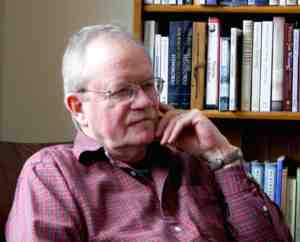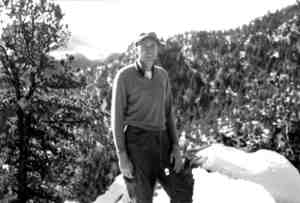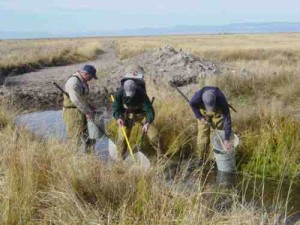Article by Sue Snively
Kent and Cathy Haruf – May 2007 – Colorado Central Magazine
THERE IS AN ORGANIZATION in the Arkansas Valley that eases the natural journey from life into death and beyond. It is called the Angel of Shavano Hospice, and is an organization that has come to the aid of over 125 families since its inception in 1988. It cares not only for those who are dying, but also their families, and Hospice continues to assist families beyond the death of their loved ones — sometimes remaining for over a year or longer if necessary.
Two Arkansas Valley residents who have been very involved in the organization are Cathy and Kent Haruf from the Maysville area. Cathy has been the volunteer coördinator for the program for the past several years and Kent is, as Cathy puts it, “one of the wonderful ones” in the volunteer program.
Cathy says, “Currently there are 41 volunteers with 9 new people about to take the twenty-hour training course.”
During the course, participants become familiar with the Hospice philosophy and learn from the experts: the nurses, physical therapists, bereavement and spiritual counselors, social workers, medical directors and the volunteer coordinator. Those taking the course also get guided exposure to actually working with Hospice patients and their families.

Most Valley residents are familiar with Kent Haruf’s name, because he’s a best-selling author, whose works include many novels, including Plainsong and Eventide, which are both based upon life in small fictional towns on the Colorado plains. Kent’s work is entertaining and emotional. His vivid portrayals of small town life, and strong characterization of major and minor players (some of whom local readers may feel they’ve met before) have given his novels national esteem — and makes them especially appealing to those who live or grew up in small towns.
Kent had no notion that he would become a writer when he was growing up on the plains of Colorado, although he was entranced with his father’s storytelling. In college, under the direction of the head of the English Department at Nebraska Wesleyan University, Kent became an avid reader of Faulkner and Hemingway, which changed his life. After that, Kent knew he wanted to write.
Kent was in the Peace Corps in Turkey for a couple of years after graduating from college in the early 1960s and began writing short stories, which he now says “were rather awful things!” But his later short stories won numerous awards and citations. Upon returning to the states after his Peace Corps experience, Kent attended an Iowa Writers’ Workshop and continued to study the art of fiction writing. After twenty years, much of it spent teaching in junior and senior high schools and in colleges, Kent published his first novel in 1984 at the age of 41. The title, Tie that Binds, as well as the titles of his subsequent novels, relates to music. Tie that Binds was taken from an old English hymn as was Eventide (from “Abide with Me” ). Plainsong is a musical term which refers to simple and unadorned ancient Christian music.
BEFORE BECOMING INVOLVED in Hospice, Cathy Haruf was a teacher in the field of Special Education. She taught for many years in Washington, D.C. and found her career very fulfilling. It was an area of teaching which required loving kindness and compassion, being a good listener, avoiding judgmental attitudes, and employing gentle direction, which made it, she says, a great training ground for her involvement in Hospice.
Cathy grew up in Colorado, and she and Kent went to the same high school in Cañon City, where they were good friends. Then they went their separate ways, although both gravitated to teaching as their first career. Cathy, besides teaching, raised five children and Kent kept busy with three daughters while pursuing his career as a teacher and writer. In the early 1990s they both attended their 30th high school class reunion in Cañon City, and rekindled their friendship, which led to their marriage, which is currently in its 11th year.

Because of the strong success of Plainsong, Kent was able to give up his job teaching fiction-writing for a master’s program at Southern Illinois University. Kent and Cathy both knew they wanted to come back to Colorado, but they didn’t want to live in a metropolitan area or near a major ski resort; they wanted a quiet place in the mountains. Thus they discovered the Arkansas Valley with its varied culture and fantastic scenery. They liked the “great towns of Salida and Buena Vista” and moved here in December of 2000.
CATHY MISSED TEACHING and her students, but didn’t want to go back to teaching regularly, because she needed the flexibility to be able to travel with Kent in order to support his writing in whatever way she could. This led her to obtain the more flexible position as the Volunteer Coördinator for the Angel of Shavano Hospice, which has been very rewarding for her.
“It is a lovely experience working with the very dedicated volunteers and professionals in the program,” Cathy said. “It is also such an honor to be allowed into the lives of patients and their families at such an intense time. In essence, you are a stranger to them and to have them accept you at such a time is a rare privilege.”
The Hospice program, besides providing interaction between Hospice volunteers and professionals, has started a bereavement support group this year, and bereavement counselors and trained volunteers are facilitating the meetings.
Kent Haruf is a firm supporter of the Hospice organization, both as a volunteer and as a support to Cathy in her position. He talked about the practical aspect of helping survivors adjust to life without their loved ones. Besides guiding survivors through the steps of grieving, volunteers help the bereaved deal with things like Social Security and other practical matters.
IN TERMS OF his writing career, Kent likes the place where he is now. He usually thinks about a novel for about a year before he starts to write, and knows the characters, the theme and the plot of his story before he puts pencil to paper. There are no surprises — except possibly the invention of minor characters.
After Kent starts to write, he labors every day to find sentences and paragraphs to convey what he wants to say. A book may take from three to six years to write. About the endings of his stories, he says: “The last paragraphs have to be good; basically the lives of the characters are not resolved and are somewhat messy, but those lives have reached a moment of peace even though the problems go on. After all, that is the way life is.”
For Kent, writing is intense labor, and being able to break loose and take in the beauty of where he lives is both necessary and rewarding. There is nothing like taking the dogs for a walk and spotting a herd of elk or deer on the hillside, or a coyote bounding through the trees.
Although Cathy is not a writer (“I am a caretaker,” she says), she helps Kent by listening to him read his chapters out loud. This helps him get a feel for how they sound and makes him realize what needs to be changed. Cathy also proofreads his final manuscripts before they go to the agent, editor, and publisher. Just as he supports her hospice endeavors, “Cathy is so supporting and encouraging of my writing endeavors.”
Both Kent and Cathy are avid readers. Besides Faulkner and Hemingway, Kent likes the works of the Native American writer, James Welch and the short story writer Mark Spragg. Cathy and Kent were both taken with Timothy Egan’s book, The Worst Hard Time, about the dust bowl in the 1930s, and also liked The Spirit Catches You Up and You Fall Down, a book about the “Hmong” people from Laos and Cambodia and their trials and tribulations upon settling in America.
They are both excited about Kent’s new book, West of Last Chance, which will feature photographs of the plains taken by photographer Peter Brown along with prose by Kent. The book is scheduled to be published in February of 2008, and Kent is also working on another novel.
Both Cathy and Kent Haruf like where they are now in their lives. They are both doing exactly what they want to do and thus feel very fortunate.
Sue Snively lives in Buena Vista with two dogs, a cat, and her husband Frank. She enjoys meeting and writing about the numerous talented people who live in the Arkansas Valley.



